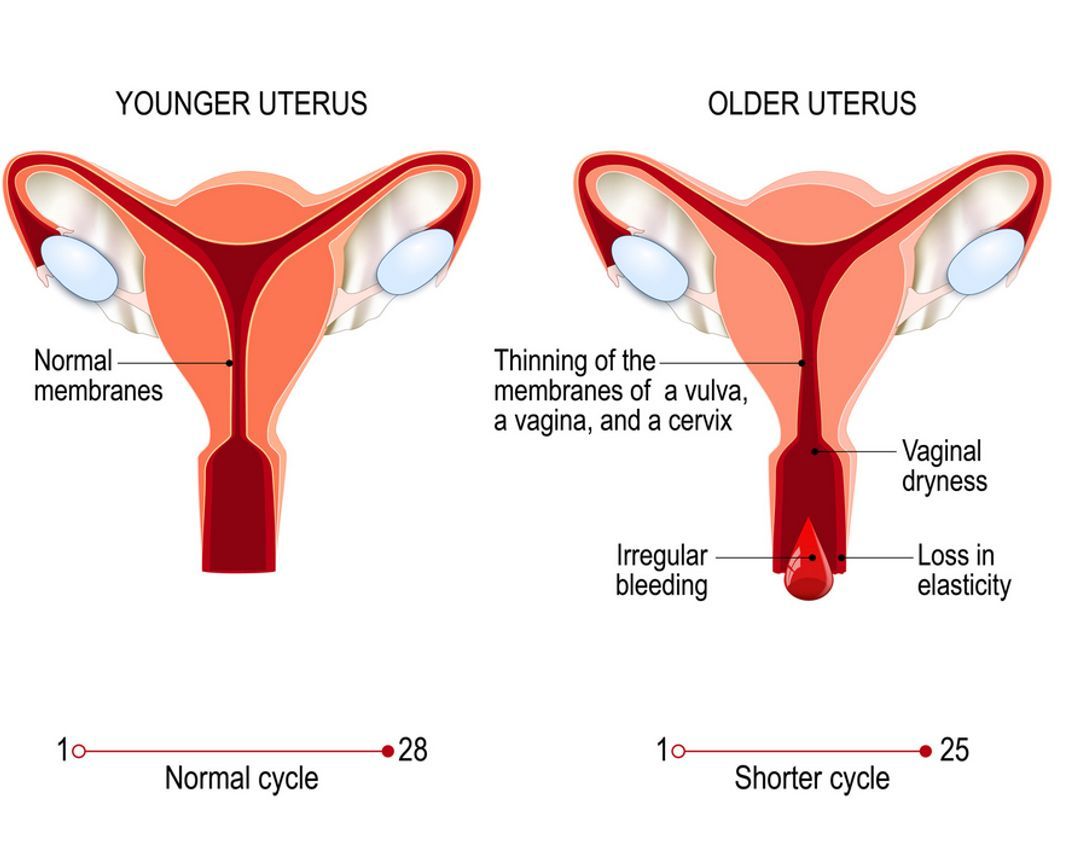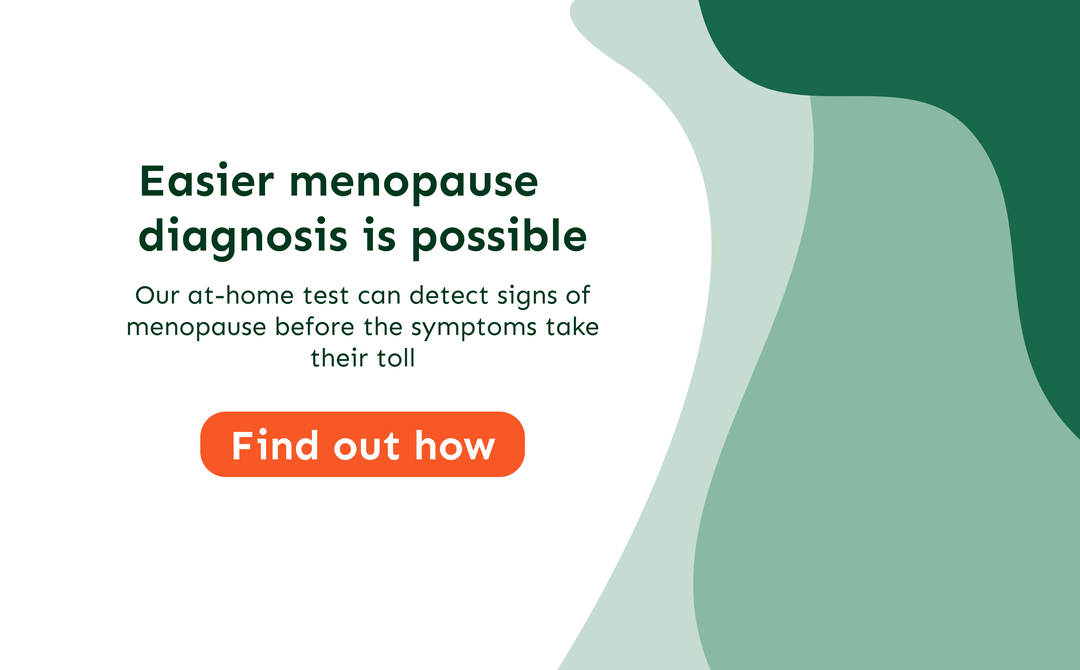- Perimenopause refers to the period of time a woman’s body makes the natural transition to menopause, marking the end of their reproductive years. Most women will be in their 40s however some can be almost a decade younger when the first symptoms begin.
- The main symptoms of perimenopause include irregular periods, hot flashes and night sweats, problems sleeping and mood swings. These symptoms can be managed at home or with the help of a medical practitioner. The options out there include prescriptions and more natural approaches, such as healthy eating, exercise and meditation.
- There is some evidence which suggests some factors that may increase the likelihood of starting perimenopause at an early age. Some of these factors include smoking, your family history, cancer treatments and hysterectomy.
The changes experienced during perimenopause are often a direct result of decreasing oestrogen. When symptoms are severe, some women opt to use hormone therapy however it does come with some health risks.
Most women understand that their menstrual cycle will end at some point when they get older, but many are unprepared for the years leading up to menopause. Perimenopause (also known as menopausal transition) refers to the period of time your body makes the natural transition to menopause – marking the end of the reproductive years.
The oestrogen levels (the primary female hormone) rise and fall unevenly during perimenopause. As a result, menstrual cycles can get shorter or longer, and there can also be menstrual cycles when your ovaries do not ovulate (release an egg). Other symptoms include hot flashes, sleep problems, and vaginal dryness.
Women start perimenopause at all different ages. Some may not notice signs of progression towards menopause until sometime in their 40s, while others will experience changes as early as in their mid-30s. This article explores this phase of a woman's life, from the symptoms to expect, potential causes of early menopause and how to manage this inevitable time of change.
The Symptoms of Perimenopause

When a woman starts the menopausal transition, some significant changes will happen in the body. However, some will be more subtle than others, and each comes with its own set of challenges. The perimenopausal symptoms you may experience include the following:
- Irregular periods – One of the more obvious symptoms you may recognise is ovulation becoming more unpredictable. The time between your periods may be shorter or longer, the flow can be lighter or heavier than usual, and some periods may be missed altogether. If there is a persistent change of seven days or more in the length of your menstrual cycle, the chances are you are entering early perimenopause. On the other hand, if you are experiencing a space of 60 days or more between your periods, you may be in the late perimenopause phase.
- Hot flashes and difficulty sleeping – With the topic of menopause, many of us think about the much-reported hot flashes. These uncomfortable hot flashes are also common during perimenopause. The length, frequency and intensity will vary from woman to woman. Hot flashes can also lead to sleep troubles. Night sweats and hot flashes can make it hard for some women to sleep, while others may find sleep unpredictable even without body temperature regulation issues.
- Mood changes – With all the uncomfortable and unpredictable symptoms of perimenopause, it is no surprise it can affect your mood. As a result, you may have mood swings, become irritable, and even have an increased risk of depression. It is important to feel supported during the challenging parts of perimenopause and for those close to you to show understanding.
- Vaginal and bladder troubles – When your oestrogen levels diminish, it is natural for your vaginal tissues to lose lubrication and elasticity. This can lead to intercourse becoming painful. Low oestrogen can also leave you more susceptible to urinary or vaginal infections. In addition, the loss of tissue tone may also lead to urinary incontinence.
- Decrease in fertility – For those wanting to conceive in their later years, perimenopause can cause some complications. As ovulation becomes irregular, the ability to conceive becomes more difficult. If you still have periods, it is still possible to become pregnant – so if you wish to avoid pregnancy, continue to use birth control.
- Changes in sexual urges – If you had a satisfactory level of sexual intimacy before menopause, it is likely you will continue to do so throughout perimenopause and the many years to come. However, some may find their desires and sexual interest may change during perimenopause.
- Reduced bone strength – With oestrogen levels dropping, you will also begin to lose bone more quickly than you can replace it. This can lead to an increased threat of osteoporosis – a condition that causes fragile bones. The early warning signs of osteoporosis include weaker grip strength, brittle fingernails, and receding gums.
- Changing cholesterol levels – The drop in oestrogen levels can also lead to adverse changes in your blood cholesterol levels. This can include an increase in low-density lipoprotein (LDL) cholesterol ("bad" cholesterol) which contributes to an increased risk of heart disease. Unfortely, at the same time, the high-density lipoprotein (HDL) cholesterol ("good" cholesterol) may also decrease in many women as they age, which can also increase the risk of cardiovascular disease.
Potential Causes of Early Menopause

Many of the perimenopause symptoms listed above are due to the body's production of oestrogen and progesterone rising and falling. The changes you experience during perimenopause are often a direct result of decreasing oestrogen. It is important to remember that menopause is a completely normal phase of life, and it may occur in some women earlier than others.
Although the research is not always conclusive, there is some evidence to suggest some factors that can increase the likelihood of starting perimenopause at an early age. Some of these factors include:
- Smoking – We all know that smoking is not good for your health and can cause premature ageing. Some studies have also shown that the onset of menopause can occur one to two years earlier in women who smoke than in women who do not smoke.
- Family history – Although a factor we have no control over, women with a family history of early menopause have an increased probability that they too may experience early menopause themselves.
- Cancer treatment – Women who had to battle cancer with chemotherapy or pelvic radiation therapy may also experience early menopause.
- Hysterectomy – A hysterectomy is a medical procedure which removes your uterus but not your ovaries. It does not automatically cause menopause, and although you will no longer experience periods, your ovaries will still produce estrogen. However, it has been recorded that women who have had such surgery may enter menopause earlier than average. If only one ovary is removed, the remaining one might also stop working sooner than expected, leading to perimenopause.
Ways to Manage Perimenopause

Perimenopause is a phase of life all women will experience, and there is no treatment to stop it. It could be considered that the "cure" to perimenopause is actually when your periods stop completely, and you enter menopause. However, this does not mean women do not have ways to manage the more unpleasant symptoms of perimenopause.
Some of the ways perimenopause symptoms can be managed at home include the following:
- When you first notice your body entering perimenopause, you will want to ensure you are living the most healthy lifestyle possible.
- Eat a diet full of fruit, vegetables, whole grains, healthy fats and lean protein.
- Try also to keep your alcohol and caffeine intake to a minimum.
- Include weight-bearing exercises like strength training, hiking or walking.
- If you find sleep a little troublesome, try to reduce screen time before bed and instead try meditation or other stress management techniques.
- For those who smoke, perimenopause is when you should quit as it can worsen symptoms.
- If you are overweight or obese, try to lose weight as it can help improve your energy levels and reduce hot flashes and night sweats. Weight gain is also common during menopause so it can be worth getting to a healthy size during perimenopause.
If you are seeking support from your medical practitioner, they may consider the following treatments:
- Oestrogen therapy is a popular option for managing symptoms as it helps to stabilise your oestrogen levels. In addition, it can be administered in various different forms, such as a cream, gel, patch or pill.
- For women struggling with mood swings or depression, a doctor may consider antidepressants.
- Birth control pills are sometimes prescribed to help stabilise hormone levels and relieve some perimenopause symptoms.
- If hot flashes are causing a huge problem, some medical professionals may consider prescribing a seizure medication called Gabapentin (Neurontin) which has been shown to help women with this uncomfortable symptom.
- Vaginal dryness and painful sex can be difficult for women during perimenopause. There are many vaginal creams available, including prescriptions and over-the-counter options.
Women who have particular difficulty with perimenopause may consider hormone therapy. As a general rule, healthcare professionals will recommend that people who decide to use hormone therapy do so within ten years of beginning menopause symptoms and continue to use it for less than five years. This is because there are known risks associated with oestrogen and hormone treatment, linked to an increased risk of heart problems and other severe health conditions.
Perimenopause is a completely natural phase of life for women and will begin at a different age for different women. It can sometimes be hard to tell whether you are actually having symptoms of perimenopause. When getting your healthcare provider to diagnose you, they will consider your age, symptoms and medical history. They may also perform a blood test to measure your hormone levels.
Some women experience very mild symptoms during perimenopause and will not require any treatments for their symptoms. Perimenopause can also be a time to make lifestyle changes to help prevent age-related conditions. It can be a time of your life when you can embrace your maturing body and look forward to a time when periods are no longer a factor.

What is the average age to be perimenopausal?
The average age for the onset of perimenopause is 47.5 years old. However, this figure will vary depending on race and ethnicity. The age you start perimenopause can also be affected by your lifestyle and where you live. Some women may experience perimenopause before the age of 40, but this will affect only around 1% of women.
What is the most common early symptom of perimenopause?
The most common symptom of perimenopause is irregular periods. However, if you do experience irregular bleeding, you may want to speak with your doctor to check if it is the beginning of perimenopause or points to another underlying problem.
Can perimenopause make you feel weird?
Every woman will have her own unique experience of perimenopause as we are all different. The hormonal fluctuations can play havoc with emotional well-being, and this symptom can also directly affect sleep health. You can feel frustrated, irritable and even angry due to the hormones, lack of sleep and low energy levels.
What is the difference between premenopausal and perimenopausal?
The difference between perimenopause and perimenopause is that perimenopause means "around menopause", whereas premenopause means "before menopause." Some healthcare professionals use the term perimenopause to refer to the years before menopause – when your hormone levels are changing but still menstruating.
Can perimenopause symptoms come and go?
The symptoms of perimenopause are unrealisable, and every day can be different. With this in mind, women should expect their symptoms to come and go for years before their period stops altogether.
References
https://www.mayoclinic.org/diseases-conditions/perimenopause/symptoms-causes/syc-20354666
https://www.bmj.com/content/344/bmj.e402.long
https://glycanage.com/blog/journeys/the-missing-link-between-menopause-and-biological-age/
https://www.thelancet.com/journals/landia/article/PIIS2213-8587(22)00076-6/fulltext
https://www.ncbi.nlm.nih.gov/pmc/articles/PMC3223258/
https://glycanage.com/blog/journeys/an-empowering-journey-through-menopause/
https://www.ncbi.nlm.nih.gov/pmc/articles/PMC5994393/
https://www.thelancet.com/journals/landia/article/PIIS2213-8587(21)00269-2/fulltext
https://insight.jci.org/articles/view/124865
https://www.ncbi.nlm.nih.gov/pmc/articles/PMC8034540/
https://www.scielo.br/j/spmj/a/HdNWyPCrwKFx4vN6T5GBMDv/?lang=en
 Menopause
Menopause





 By Vanja Maganjić
By Vanja Maganjić